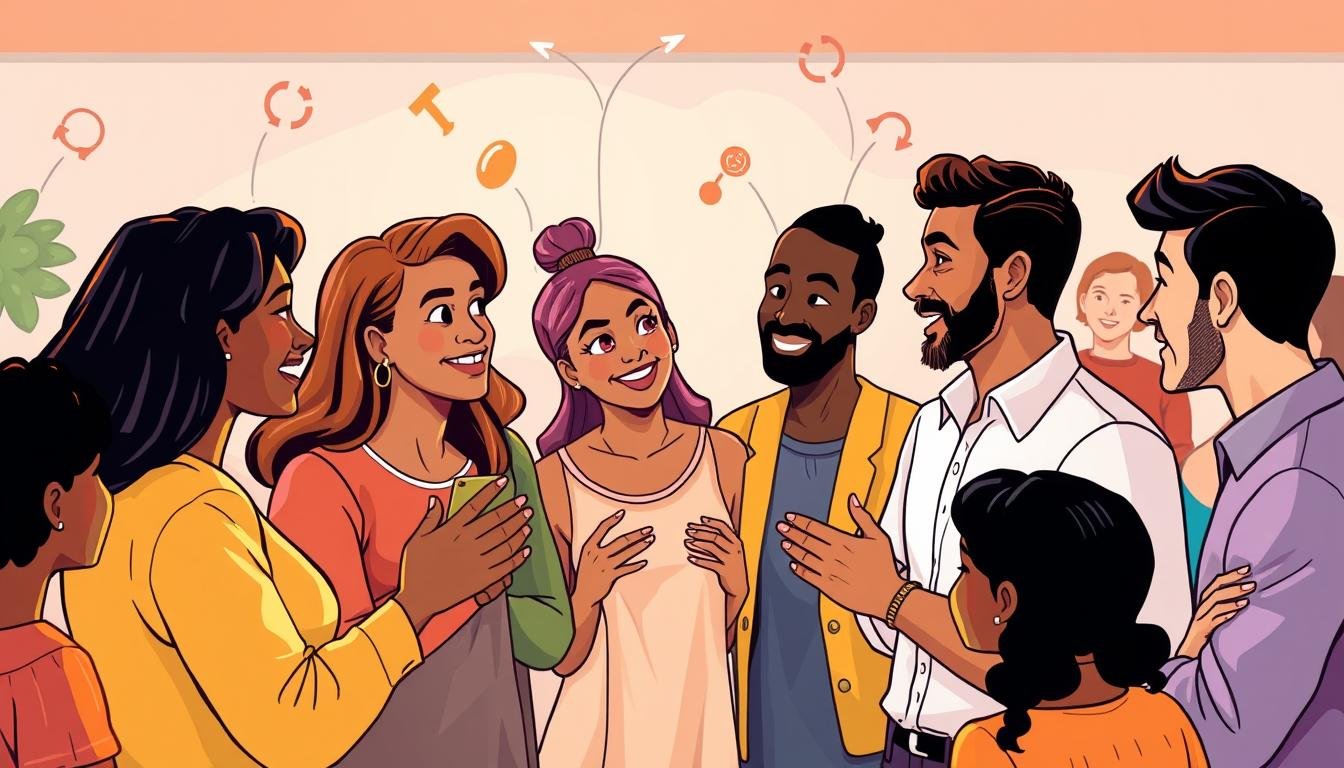Boost Your Interpersonal Skills: Connect Better.
Ever wondered why some people easily make strong connections while others find it hard? Learning to improve your interpersonal skills could change everything. This guide will help you become better at building relationships and socializing, helping you succeed in both your personal and work life.
A study by the Australian Institute of Management Education and Training found that interpersonal skills are key for good leadership. People say that communication, emotional intelligence, and managing others are essential for leaders. Being good at social skills builds trust and teamwork, and it can open up more career opportunities. In fact, 85% of professionals think these skills are vital for moving up in their careers.
Moreover, 75% of workers say that good relationships at work make them happier in their jobs. So, don’t miss this chance to improve how you connect with others. Read our article to learn how to better your relationship-building skills and see your life get better.
Key Takeaways
- Interpersonal skills are crucial for leadership and career advancement.
- Effective communication and active listening improve workplace understanding by up to 40%.
- Empathy can lead to a 60% increase in successfully resolving workplace conflicts.
- Positive workplace relationships enhance job satisfaction for 75% of employees.
- Assertive communication boosts successful negotiations and problem-solving by 50%.
What Are Interpersonal Skills?
Interpersonal skills, also known as social skills or people skills, are key for good interactions with others. They help build positive relationships and success in work and personal life. Skills like communication, listening, empathy, and solving conflicts are part of it. These skills are vital in many jobs, from tech to customer service.
Definition and Importance
Interpersonal skills help us get along well with others. Employers often look for these skills when hiring. They make teamwork better, communication smoother, and work environments more productive.
In fact, 86 percent of people think failures at work come from poor teamwork and communication. So, improving these skills can help you advance in your career and be happier at work.
Examples of Interpersonal Skills
Some important interpersonal skills include:
- Communication: Both talking and non-verbal cues are crucial in all fields.
- Active Listening: Shows respect and value for others by really listening.
- Empathy: Helps us understand and connect with others, whether at work or with clients.
- Conflict Resolution: Important for keeping the workplace calm and productive.
- Teamwork: Means working well together, motivating each other, and achieving goals.
- Leadership: Involves inspiring and guiding a team towards common goals.
- Negotiation: Essential for making deals and solving problems in various roles.
Even jobs that seem solo, like a statistician or software developer, need strong interpersonal skills. Good communication and teamwork are key to success. By improving these skills, you can make your workplace better, grow professionally, and strengthen relationships.
Benefits of Improved Interpersonal Skills
Improved interpersonal skills bring many benefits to the workplace. They help create a welcoming and united team environment. They also pave the way for career growth. Let’s look at the many advantages of improving these skills for success at work.
Enhanced Camaraderie and Teamwork
Strong teamwork skills lead to a better work atmosphere. Good interpersonal skills help team members bond and communicate openly. This builds respect and boosts morale, leading to better teamwork and productivity.
Increased Trust and Dependability
Strong interpersonal skills build trust in the team. Trust and dependability are key for a successful workplace. Emotional intelligence and self-awareness help manage relationships and solve conflicts. Gallup’s research shows this leads to better employee engagement and keeping staff.
Greater Career Opportunities
Refined interpersonal skills boost your career. For instance, 28% of jobs value communication skills, and 8% value teamwork. These skills make you more appealing to employers and prepare you for leadership. Skills like emotional intelligence, adaptability, and problem-solving open doors to new opportunities and success.
Developing and Improving Interpersonal Skills
Improving how we interact with others is a lifelong journey. It’s all about continuous improvement. We get better by practicing every day and being open to change. This is key for growing both personally and professionally.
By taking small steps and asking for feedback, we can improve our skills. This helps us build stronger, more meaningful relationships.
Practice Through Daily Actions
Being active in different social settings is crucial. This includes family, work, and community events. Listening well and giving helpful feedback are important steps.
These actions help us grow professionally and connect better with others. The book “How to Win Friends and Influence People” by Dale Carnegie shows how daily positive interactions can improve our social lives.
Tweaking Based on Feedback
Feedback is key for improving our social skills. Asking for opinions from others can give us valuable insights. It helps us understand how we communicate and interact with others.
Being open to feedback and making changes is important. It not only helps us grow but also improves our work environment. Courses like “Coaching Skills for Managers” and “Inspirational Leadership: Leading with Sense” focus on this.
In summary, being consistent and open to feedback is essential for improving our social skills. This journey not only helps us grow professionally but also makes our personal relationships stronger and more effective.
Effective Communication Skills
Effective communication is key to understanding feelings and what others mean. It’s about being good at talking and listening, and also at body language. This skill helps avoid misunderstandings that can cause trouble in relationships. Let’s explore what makes communication effective.
Verbal and Non-Verbal Communication
Talking and writing are part of verbal communication. Being clear in what you say and write is crucial. Non-verbal communication, like body language and facial expressions, also sends messages.
Non-verbal signals are very powerful. Professor Mehrabian found that body language speaks louder than words. It’s important to match your body language with what you say and adjust it to the situation.
Active Listening Techniques
Listening well is key to good communication and strong relationships. It means focusing on the speaker, avoiding interruptions, and showing you care. It also means not judging too quickly and giving feedback.
- Focus on the Speaker: Give your full attention to understand the message.
- Favor the Right Ear: Listening with your right ear helps catch emotional tones better.
- Avoid Interruptions: Let the speaker finish before you respond.
- Show Interest: Use nods and eye contact to show you’re engaged.
- Set Aside Judgment: Listen without judging right away.
- Provide Feedback: Repeat back what you heard to show you understand.
Using these listening tips can make you better at understanding and communicating. It’s a skill that helps in both personal and work relationships. Active listening is a vital skill for growth.
Learning to communicate well can make connections stronger, build trust, and improve teamwork. By working on verbal and non-verbal skills, and listening actively, you can improve how you interact with others.
The Role of Empathy in Building Relationships
Empathy is key in both personal and work relationships. It helps create deeper connections and understanding. By adding empathy in relationships, we can truly connect with others. This leads to more supportive and caring places.
Understanding and Caring
A study with 330 students and 279 community members showed empathy’s importance. It found that people are more empathetic when they’re with friendly others. By using emotional intelligence, we can better understand and help others, making our connections real and caring.
The study also linked empathy to helping others, like being kind and cooperative. This means caring for others strengthens our personal and work bonds. It also helps us work better together in many areas.
Practicing Empathetic Behavior
To grow empathy, we must act empathetically all the time. Showing real interest in others and listening well can make our relationships better. People want to work for places that care about empathy and being inclusive.
Studies show empathetic workplaces keep employees longer and attract more diverse talent. This diversity brings new ideas. Empathetic leaders make better decisions, helping everyone in the organization. This approach makes our work and personal lives more fulfilling.
Conflict Resolution Strategies
Learning how to solve conflicts is key to a peaceful workplace. It’s about understanding why conflicts happen, finding ways to fix them, and rebuilding relationships after. These steps are vital for keeping things smooth.
Recognizing Causes of Conflict
Conflicts usually start from different values, goals, or beliefs. These differences can make people upset and lead to fights. Knowing what causes these issues is the first step to solving them.
Ignoring problems or getting angry doesn’t help. Instead, listening and staying calm can make a big difference. It shows respect and understanding.
Steps to Resolve Conflicts Effectively
Good negotiation skills are crucial for solving conflicts. Here are some important steps:
- Identify the Cause: Find out why the conflict started by understanding everyone’s point of view.
- Communicate Clearly: Talk openly and listen well to make sure everyone’s needs are heard.
- Manage Emotions: Keep your cool to avoid making things worse. It’s important to be aware of your feelings.
- Find Common Ground: Look for a solution that works for everyone involved.
- Follow Through: Make sure to follow up on the agreed solution to prevent future problems.
M. Afzalur Rahim says there are five ways to handle conflicts: competing, avoiding, accommodating, compromising, and collaborating. Choosing the right approach is key to solving disagreements.
Post-Conflict Relationship Building
Fixing relationships after a conflict is important for lasting peace. A good solution can increase understanding and trust. It makes relationships stronger.
Remember, conflict resolution is about finding solutions that work for everyone. By improving your negotiation skills and managing disagreements well, you create a better work environment.
The Importance of Collaboration Skills
In today’s world, collaboration skills are key. They help teams work together to achieve goals. This is done through shared responsibilities, open communication, and respect for each other.
Collaboration skills are very important. A 2014 study from the University of North Carolina’s Kenan-Flagler Business School found nine key skills for teamwork. These include embracing change, asking for input, and sharing information.
- Embracing change
- Asking for input from others
- Sharing information
- Listening for understanding
- Providing constructive feedback
- Using negotiation skills
- Recognizing and rewarding others
- Improving self-awareness
- Reaching consensus
Proximity Designs is a great example of using these skills. They were named one of the 50 Best Workplaces for Innovators in 2019. They used empathy and design thinking to help farmers, even after Cyclone Nargis in 2008.
Good teamwork builds trust and creates safe spaces for conversations. This shows how collaboration skills can lead to success, even in tough situations. Collaboration also makes teams more productive and inclusive.
Strong collaboration skills break down barriers between departments. This encourages teamwork and sharing of knowledge and ideas. It also boosts morale, improves team dynamics, and helps retain employees.
Being open-minded and communicating well are key in teamwork. Clear communication helps teams solve problems together. Being organized also helps manage tasks and stay focused on goals.
Skills like adaptability and constructive debating are important for teamwork. They help teams adjust to changes and have healthy discussions. Long-term thinking is also crucial for planning and achieving goals together.
The Importance of Collaboration Skills
Tips for Showcasing Interpersonal Skills During a Job Search
Job seekers can stand out by showing their interpersonal skills. Focus on resumé building and interview techniques to impress employers.
Highlighting Interpersonal Skills on a Resumé
Today, most jobs need both technical and interpersonal skills. Employers look for traits that help people work well together and keep a positive work place.
- Align with Job Descriptions: Make sure your resumé shows skills like communication and teamwork that fit the job.
- Utilize Summaries and Skills Sections: Use the start of your resumé or a skills section to list these abilities clearly.
- Demonstrate in Experience Sections: Share examples of how your skills, like empathy and negotiation, helped in your work.
Demonstrating Skills During an Interview
Interviews are key to showing your interpersonal skills. Employers want to see both technical skills and strong people skills, like empathy.
- Provide Specific Examples: Talk about times when your skills helped solve problems or resolve conflicts.
- Engage Actively: Show you can listen well and respond thoughtfully by practicing active listening.
- Show Adaptability: Share how your skills helped you adjust to new situations or challenges at work.
Using these job search strategies can help you make a strong impression on employers.
Conclusion
Interpersonal skills are key for personal growth and success at work. They include talking well, listening actively, and understanding others. These skills are very important in any job.
Companies that value these skills attract the best workers. Workers who are good at them are happier and stay longer in their jobs.
Strong interpersonal skills help teams work better and build trust. They also open up more career chances. Good communication, listening, and empathy are crucial for success.
These skills make people feel important and boost motivation. Empathy is vital for strong relationships at work and in life.
To get better at these skills, you need to keep learning and practicing. Improving your social skills helps you make a big impact in your life and career. It’s a journey that makes you better at work and in your personal life.
Source Links
- Important Interpersonal Skills You Need to Be an Effective Leader
- 9 Strategies for Improving Your Interpersonal Skills
- What Are Interpersonal Skills?
- What are intrapersonal skills?
- Interpersonal Skills: What They Are, Why They’re Important and How to Build Them | Built In
- Interpersonal Skills: How They Benefit the Work Environment
- The benefits of strong interpersonal skills at work
- Interpersonal Skills: What They Are And Why They’re Important To Getting Hired
- What Are Interpersonal Skills? And How to Strengthen Them
- What Are Interpersonal Skills? 5 Ways To Improve Interpersonal Skills – HiHello
- How To Improve Interpersonal Skills In The Workplace In 7 Easy Steps
- Effective Communication: Improving Your Interpersonal Skills
- Top 4 Interpersonal Communication Skills | Build Your Career
- How to Use Interpersonal Skills to Get and Keep a Job
- The Affiliative Role of Empathy in Everyday Interpersonal Interactions
- The Role of Empathy in Strengthening Workplace Relationships
- Conflict Resolution Skills – HelpGuide.org
- 6.2 Conflict and Interpersonal Communication
- Collaboration skills: What they are and how to improve them
- What are collaboration skills (and why do they matter)?
- How to use interpersonal skills in the job search
- Interpersonal Skills: Your Career Edge
- Interpersonal Skills: The Key To Business Success
- Interpersonal Communication: Definition, Skills & Examples








